The Finals. It's the most exciting time for any NBA fan. This is where the top two teams bring their best out and battle for the NBA championship. And for those star players who lead their team to the title, there's the added motivation of the Bill Russell NBA Finals MVP award -- aptly named as Russell, has won a whopping 11 championships in his career.
In recent times, the likes of Kevin Durant, LeBron James, and Kawhi Leonard have received the award. But, there were many great champions that came before them. Here is a look at the top five players with the most NBA Finals MVP awards.
#5 LeBron James - 3 NBA Finals MVP Awards
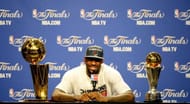
Explore the NBA Draft 2024 with our free NBA Mock Draft Simulator & be the GM of your favorite NBA team.
LeBron James is considered one of the greatest basketball players of all time, if not the greatest. Being drafted straight out of high school in 2003, many knew he was destined for greatness. LeBron spent the first seven years of his career with the Cleveland Cavaliers, during which time he led them to the finals in the 06-07 season. They lost the title to the San Antonio Spurs though.
During this seven-year span, many questioned LeBron and his greatness, stating his career would not be validated until he won a championship. This would all change when he made the decision to join the Miami Heat. Alongside All Stars Dwyane Wade and Chris Bosh, the Heat made four straight finals appearances, winning two -- the 2011-12 and 2012-13 seasons.
In the 11-12 season, the Heat faced off against a young Oklahoma City Thunder team and beat them 4-1. During this series, LeBron averaged a double-double with 28.6 points per game and 10.2 rebounds per game. He also added 7.4 assists and 1.4 steals to win his first NBA Finals MVP award.
In the 12-13 Finals, the Heat met the San Antonio Spurs. During this series, James' points dropped in comparison to the previous years, but he still added a lot of value with his rebounding, assists, and defense. James finished the series with 25.3 points, 10.9 rebounds, 7 assists and 2.3 steals per game. This all-around effort led the team to their second championship and his second NBA Finals MVP award.
After opting out of the last year of his contract with the Heat, James returned to Cleveland. Alongside Kyrie Irving and Kevin Love, James led the Cavs to their second straight finals appearance against the Golden State Warriors. The Cavs started the series slowly and the Warriors were expected to run away with the win after going up 3-1 in the series.
However, in a historic turn of events, the Cavs managed to claw their way back to into the series to tie it 3-3 and eventually win game 7. The team rallied around LeBron and Kyrie to bring Cleveland their first ever NBA championship.
In this series, LeBron was an absolute standout. He averaged 29.7 points, 11.3 rebounds and 8.9 assists per game. In addition to his offensive display, he had 2.6 steals and 2.3 blocks per game. This performance was good enough to bring LeBron his third NBA Finals MVP award and a much-awaited championship to Cleveland.
#4 Tim Duncan - 3 NBA Finals MVP Awards
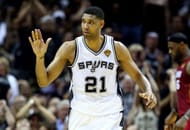
Tim Duncan, 'The Big Fundamental', is a five-time NBA Champion with the San Antonio Spurs and arguably the greatest power forward of all time. Duncan made his name by sticking to the fundamentals of basketball and executing it exceptionally well.
Tim Duncan won the first of his awards along with his first championship in the 1999 NBA finals when the Spurs beat the New York Knicks in five games. During this series, there was no questioning that Duncan would win the award, as he averaged 27.4 points, 14 rebounds and 2.4 assists per game. He also added one steal and 2.2 blocks per game.
In the following years, Duncan and the Spurs would always find themselves in the playoffs but were unable to advance to the finals again until 2003, where they met the New Jersey Nets. The Spurs won the series in six games and Duncan averaged 24.2 points, 17 rebounds, five assists, one steal and an impressive 5.3 blocks per game. Through the series, Duncan led the team in all major stats other than steals, and this feat earned him his second NBA Finals MVP award.
Duncan won his last finals MVP award for the 2005 championship run. The Spurs faced the Detroit Pistons and managed to seal the deal in seven games. During this series, Duncan averaged 20.6 points, 14.1 rebounds, 2.1 assists, 0.4 steals and 2.1 blocks. His numbers had dropped in comparison to his previous finals appearances, but strong performances from Tony Parker and Manu Ginobili gave Duncan the support he needed as he won his third NBA Finals MVP award.
#3 Shaquille O'Neal - 3 NBA Finals MVP Awards
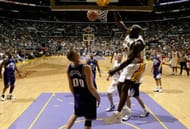
Shaquille O'Neal is one of the greatest centers of all time, and the most dominant player of all time. Originally drafted by the magic in 1992, he signed with the Lakers in 1996 and would go on to win his first three NBA championships alongside Kobe Bryant.
The first of these championships came during his MVP season in 2000. The Lakers played against the Indiana Pacers and won the series in six games. Through these six games, O'Neal averaged a staggering 38 points, 16.7 rebounds, 2.3 assists, 1 steal, and 2.7 blocks. For this incredible performance, he was awarded his first NBA Finals MVP award.
The following season, the Lakers would make it to the finals yet again to face off against the Philadelphia 76ers. Through the five games that it took the Lakers to beat the Sixers, Shaq averaged 33 points, 15.8 rebounds. 4.8 assists, 0.4 steals, and 3.4 blocks.
The Lakers would make it three in year in the 2001-02 season and swept the New Jersey Nets en route to their third consecutive championship. The sheer dominance of Shaquille O'Neal was on full display again as he averaged 36.3 points, 12.3 rebounds, 3.8 assists, 0.5 steals and 2.8 blocks. This brought Shaq his third and last NBA Finals MVP award.
Shaq would go on to play for the Heat, the Suns, the Cavaliers, and the Celtics before retiring.
#2 Magic Johnson - 3 NBA Finals MVP Awards
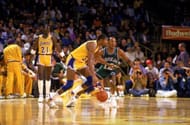
Magic Johnson is acknowledged as the greatest point guard of all time. His height, length, and vision made him a deadly weapon in open court. He is a five-time NBA Champion, three-time league MVP, and three-time finals MVP.
The Lakers made it to the 1980 NBA Finals and beat the Philadelphia 76ers in six games. During this series, Johnson averaged a near triple-double with 21.5 points, 11.2 rebounds, 8.7 assists, 2.7 steals, and 0.3 blocks.
In Game 5, Kareem Abdul-Jabbar, who was the league MVP at the time, suffered an ankle injury that forced him to sit out Game 6. Without their star center, Magic Johnson decided to step in to the position and had what is arguably the best game of his career. This performance gave him his first NBA Finals MVP award.
The Lakers faced off against the Sixers again in the 1982 finals and were able to close out the series in six games. Once again, Magic averaged a near triple-double with 16.2 points, 10.8 rebounds, 8 assists, 2.5 steals, and 0.3 blocks. Because of his strong all-around performance, he was awarded the finals MVP a second time.
Magic Johnson's last finals MVP award came by way of the 1987 championship. The Lakers faced the Sixers and beat them in six games. Compared to his previous finals appearances, Johnson stepped up with his offensive production as he averaged 26.2 points, 8 rebounds, 13 assists, 2 steals, and 0.3 blocks. Kareem Abdul-Jabbar and James Worthy also had a great series under the leadership of Johnson.
#1 Michael Jordan - 6 NBA Finals MVP Awards
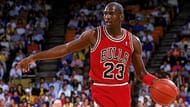
Michael Jordan is known as the greatest player of all time. In many ways, it is hard to imagine the amazing things he did. He has never lost a finals series, has multiple league MVP awards, a Defensive Player of the Year award and even a Rookie of the Year award. Adding to this, he has won the finals MVP award in all six of his championship runs with the Chicago Bulls.
The first of these finals MVP awards came to Jordan in the 1991 NBA Finals as the Chicago Bulls played against Magic Johnson and the Lakers. Alongside Scottie Pippen, Jordan averaged 31.2 points, 6.6 rebounds, 11.4 assists, 2.8 steals, and 1.4 blocks. The Bulls went on to win the series 4-1.
In 1992, Jordan and the Bulls found themselves in the finals yet again, this time against the Portland Trail Blazers. The Bulls won the series 4-2 as Jordan won the Finals MVP award with a set of amazing performances. He averaged 35.8 points, 4.8 rebounds, 6.5 assists, 1.7 steals and 0.3 blocks per game.
The Bulls advanced to the finals for the third straight year in 1993, when they beat the Phoenix Suns 4-2. Jordan averaged an astonishing 41 points, 8.5 rebounds. 6.3 assists, 1.7 steals, and 0.7 blocks. He contributed in all aspects of the floor and dominated every game on the way to his third championship, and third Finals MVP in a row.
Following this three-peat, Jordan took a hiatus from basketball and played minor league baseball before eventually making an NBA comeback with the Bulls in 1995. When he returned, it was almost like he had never left, and led the Bulls to the 1996 finals against the Seattle Supersonics. The Bulls won the series 4-2 behind Jordan's 27.3 points, 5.3 rebounds, 4.2 assists, 1.7 steals, and 0.2 blocks. He found himself winning his fourth Finals MVP award as well.
The Bulls, led by Jordan, got to the finals once more in 1997 and beat the Utah Jazz 4-2. This finals victory brought Jordan his fifth championship and his fifth Finals MVP award. He averaged 32.3 points, 7 rebounds, 6 assists, 1.2 steals, and 0.8 blocks.
In the 97-98 season, Jordan would once again lead the Bulls to the finals for the third straight time. They met the Jazz and eventually won the series 4-2. Jordan averaged 33.5 points, 4 rebounds, 2.3 assists, 1.8 steals, and 0.7 blocks. This was the last time Jordan made it to the NBA Finals.
Jordan would retire once more before making a second comeback with the Washington Wizards in 2001. He played two seasons with them and finally retired in 2003.
Los Angeles Lakers Fan? Check out the latest Lakers depth chart, schedule, and roster updates all in one place.
